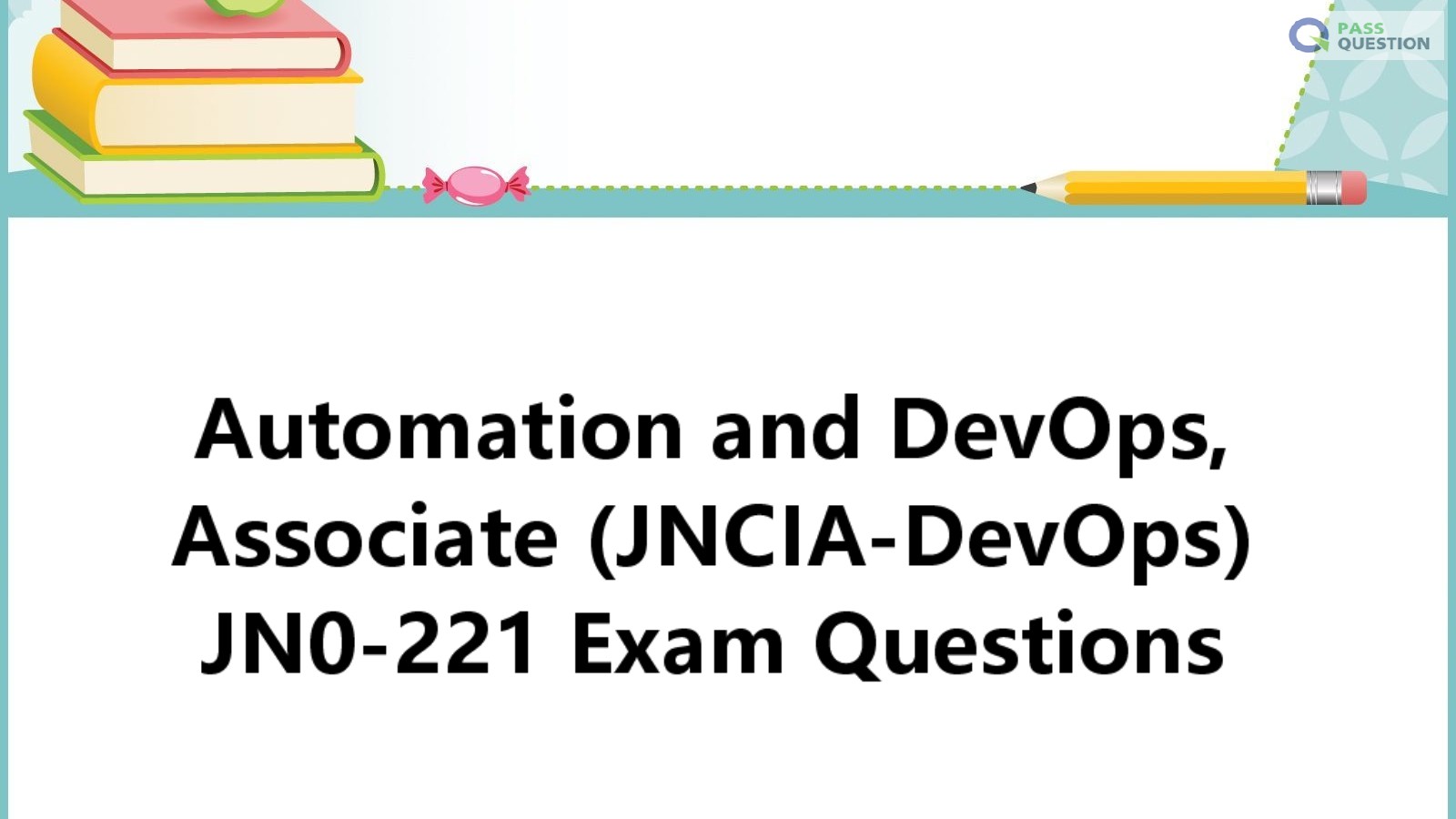Automation and DevOps, Associate (JNCIA-DevOps) JN0-221 Exam Questions
JN0-221 Automation and DevOps Associate (JNCIA-DevOps) exam is a hot Juniper JNCIA-DevOps certification test instead of retired JN0-220 exam. You can get the latest Automation and DevOps, Associate (JNCIA-DevOps) JN0-221 Exam Questions from PassQuestion to prepare you best for your coming JN0-221 Certification Exam. With the help of PassQuestion JN0-221 questions and answers,you can quickly grasp the points you need for JN0-221 test, PassQuestion guarantees that you will be easily able to succeed in your JNCIA-DevOps Certification JN0-221 Exam.

JNCIA-DevOps JN0-221 Exam Details
Automation and DevOps, Associate (JNCIA-DevOps) certification is designed for networking professionals with introductory-level knowledge of automation tools and best practices. The written exam for the certification verifies the candidate’s understanding of DevOps and automation concepts as they pertain to Juniper devices and solutions.
Exam code: JN0-221
Administered by Pearson VUE
Exam length: 90 minutes
Exam type: 65 multiple-choice questions
Scoring and pass/fail status is available immediately
Junos Software: 20.1
Python: 3.4+
Ansible: 2.9
JNCIA-DevOps JN0-221 Exam Topics
Junos Automation Stack and DevOps Concepts
Identify concepts and general features of Junos automation or DevOps
- Automation tools
- Automation frameworks
- Automation APIs
- DevOps culture, practices, and tools
XML/NETCONF
Identify concepts and general functionality of XML, the XML API, XPath, or NETCONF
- XML concepts and syntax
- XPath concepts and syntax
- NETCONF concepts
- XML API concepts and syntax
Data Serialization
Identify the concepts, benefits, or operation of data serialization
- YAML
- JSON
Ansible
Identify the use of Ansible for automating Junos tasks
- Architecture and capabilities
- Play books
- Juniper Junos Ansible modules: modifying configurations, operations commands, and software updates
- Basic inventory files
Python/PyEZ
Identify Python or PyEZ tools for automating Junos
- Syntax and concepts
- RPCs
- PyEZ exception handling
- Device status and configuration handling
REST API
Identify the concepts, benefits, or operation of the Junos REST API
- Configuring the Junos REST API
- Using the REST API Explorer
- Using curl to access the REST API
View Online Automation and DevOps Associate (JNCIA-DevOps) JN0-221 Free Questions
1. Which statement is correct about XML element nodes?
A. The element node is the value assigned within an opening and closing tag pair.
B. An element node cannot be nested with another element node.
C. The element node is defined by the first opening and closing tag pair of the XML document.
D. An element node consists of everything between an opening and closing tag pair.
Answer: D
2. What are two advantages of the DevOps approach to network automation? (Choose two.)
A. to lower cost
B. to improve quality
C. to perform manual configuration tasks
D. to rotate job roles
Answer: AB
3. Ansible playbooks are written in which format?
A. JSON
B. XML
C. YAML
D. Python
Answer: C
4. Which code format is a valid example of an HTTP GET method?
A. protocol:port//device/procedure/rpc
B. protocol://device:port/procedure/rpc
C. protocol://device:port/rpc/procedure
D. protocol:port//device/rpc/procedure
Answer: C
5. What is required to enable the Junos OS to accept NETCONF sessions on port 830?
A. Initiate an event with the <create-subscription> command.
B. Define the port number that NETCONF will use.
C. Purchase a NETCONF license.
D. Enable NETCONF using the set system services netconf ssh command.
Answer: D
6. The gem install net-netconf command is used to install NETCONF for which language?
A. Python
B. Ruby
C. Go
D. Perl
Answer: B
- TOP 50 Exam Questions
-
Exam
All copyrights reserved 2025 PassQuestion NETWORK CO.,LIMITED. All Rights Reserved.

